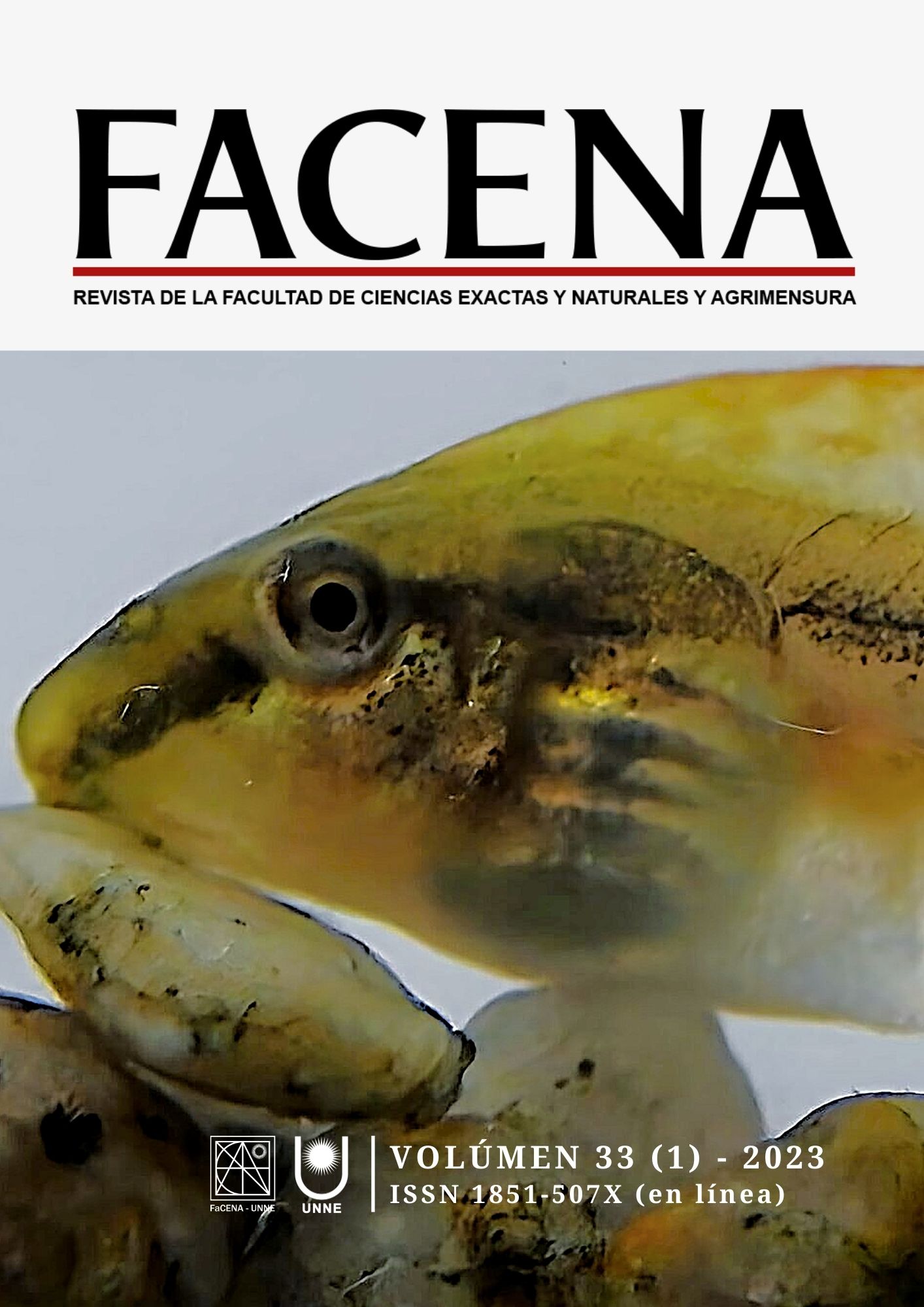Citizen Science for Meteorological Monitoring of the Coast of the Province of Buenos Aires, Argentina
DOI:
https://doi.org/10.30972/fac.3317370Keywords:
participatory monitoring, participatory research, meteorological events, microclimate, coastal urbanizationAbstract
Citizen science is an effective tool that enables monitoring and understanding of environmental phenomena. Within this context, the objective of this work was to analyze the methodology and development of the first urban meteorological monitoring network in the Buenos Aires province, Argentina, through citizen science. The process consisted of three phases: volunteer training, installation of equipment for data collection, and data validation and result communication. The monitoring network was distributed across 23 coastal localities and comprised 84 manual rain gauges and 16 devices equipped with temperature and humidity sensors designed to analyze micro-local conditions generated by urban development. Additionally, 15 weather stations were installed to validate data collected by citizens. The results were communicated through a website providing both information and real-time, freely accessible public meteorological data. The gathered information will be used to build a database that examines the effects of meteorological events at micro-local, local, and regional levels, supporting decision-making in urban planning and raising public awareness about local climate variability.
Downloads
References
Bonney, R. et al. 2009. Citizen Science: A Developing Tool for Expanding Science Knowledge and Scientific Literacy. BioScience, 59(11): 977-984. https://doi.org/10.1525/bio.2009.59.11.9
Bonney, R., Phillips, T.B., Ballard, H.L., y Enck, J.W. 2016. Can citizen science enhance public understanding of science? Public understanding of science, 25(1): 2-16. https://doi.org/10.1177/0963662515607406
Bustos, M.L., y Ferrelli, F. 2022. Caracterización ambiental de Mar Azul y Mar de las Pampas (Buenos Aires, Argentina) a través de ciencia ciudadana. Geográfica digital, 19(38): 25-35. https://doi.org/10.30972/geo.19385981
Conrad, C. C., y Hilchey, K. G. 2011. A Review of Citizen Science and Community-Based Environmental Monitoring: Issues and Opportunities. Environmental Monitoring and Assessment, 176(1–4): 273–291. https://doi.org/10.1007/s10661-010-1582-5
Cooper, C.B., Dickinson, J., Phillips, T., y Bonney, R. 2012. Citizen Science as a Tool for Conservation in Residential Ecosystems. Ecology and Society, 17(4): 11. https://www.jstor.org/stable/26267884
Domingo-Marimon, C. et al. 2022. Aligning citizen science and remote sensing phenology observations to characterize climate change impact on vegetation. Environmental Research Letters, 17(8): 085007. https://doi.org/10.1088/1748-9326/ac8499
Earp, H.S. y Liconti, A. 2020. Science for the future: the use of citizen science in marine research and conservation. YOUMARES 9-The Oceans: Our Research, Our Future: Proceedings of the 2018 Conference for Young Marine Researcher in Oldenburg, Germany (pp. 1-19). Springer International Publishing. https://doi.org/10.1007/978-3-030-20389-4_1
Follett, R. y Strezov, V. 2015. An Analysis of Citizen Science Based Research: Usage and Publication Patterns. PLOS ONE, 10(11): e0143687 https://doi.org/10.1371/journal.pone.0143687
Fraisl, D. et al. 2022. Citizen science in environmental and ecological sciences. Nature Reviews Methods Primers, 2(1): 64 https://doi.org/10.1038/s43586-022-00144-4
Gacutan, J., Oliver, J.L., Tait, H., Praphotjanaporn, T., y Milligan, B.M. 2023. Exploring how citizen science projects measuring beach plastic debris can support UN Sustainable Development Goals. Citizen Science: Theory and Practice, 8(1). https://doi.org/10.5334/cstp.563
Garna, R. K., Easton, Z. M., Faulkner, J. W., Collick, A. S., y Fuka, D. R. 2023. Employing higher density lower reliability weather data from the Global Historical Climatology Network monitors to generate serially complete weather data for watershed modelling. Hydrological Processes, 37(11): e15013. https://doi.org/10.1002/hyp.15013
Haklay, M., Basiouka, S., Antoniou, V., y Ather, A. 2015. How Many Volunteers Does It Take to Map an Area Well? The Validity of Linus’ Law to Volunteered Geographic Information. Cartographic Journal, 52(4): 336-341. https://doi.org/10.1179/000870410X12911304958827
Kullenberg, C., Kasperowski, D., y Kasperowski, D. 2016. What Is Citizen Science? A Scientometric Meta-Analysis. PLoS ONE, 11(1): e0147152. https://doi.org/10.1371/journal.pone.0147152
López-Moreno, J.I., Vicente-Serrano, S.M., y Morán-Tejeda, E. 2011. Impact of climate variability and land use changes on urban development: A case study in the Spanish Pyrenees. Climatic Change, 105(3-4): 399-416. https://doi.org/10.1016/j.scitotenv.2013.09.031
Naqshbandi, K. Z., Jeon, Y. H., y Ahmadpour, N. 2023. Exploring Volunteer Motivation, Identity and Meaning-Making in Digital Science-Based Research Volunteering. International Journal of Human–Computer Interaction, 39(20): 4090-4111. https://doi.org/10.1080/10447318.2022.2109246
Njue, N., et al. 2019. Citizen science in hydrological monitoring and ecosystem services management: State of the art and future prospects. Science of the Total Environment, 693: 133531. https://doi.org/10.1016/j.scitotenv.2019.07.337
Reges, H.W., Doesken, N. Turner, J. Newman, N. Bergantino, A. y Schwalbe, Z. 2016. COCORAHS: The evolution and accomplishments of a volunteer rain gauge network. Bull. Amer. Meteor. Soc., vol 97: 1831-1846. https://doi.org/10.1175/BAMS-D-14-00213.1
Rotman, D., Preece, J., Hammock, J., Procita, K., Hansen, D., Parr, C., y Lewis, D. 2012. Dynamic Changes in Motivation in Collaborative Citizen-Science Projects. En: Proceedings of the ACM 2012 Conference on Computer Supported Cooperative Work, febrero 2012: 217–226. https://doi.org/10.1145/2145204.2145238
Senabre Hidalgo, E., Perelló, J., Becker, F., Bonhoure, I., Legris, M., y Cigarini, A. 2021. Participation and co-creation in citizen science. Chapter 11. En: Vohland K. et al. (Eds). 2021. The Science of Citizen Science. pp: 199-218. Springer. https://doi.org/10.1007/978-3-030-58278-4
Shirk, J.L. et al. 2012. Public Participation in Scientific Research: A Framework for Deliberate Design. Ecology and Society, 17(2): 29. http://dx.doi.org/10.5751/ES-04705-170229
Walker, D. W., Smigaj, M., & Tani, M. (2020). The benefits and negative impacts of citizen science applications to water as experienced by participants and communities. Wiley Interdisciplinary Reviews: Water, 8(1), e1488. https://doi.org/10.1002/wat2.1488
Downloads
Published
Versions
- 2024-03-13 (2)
- 2024-03-11 (1)








